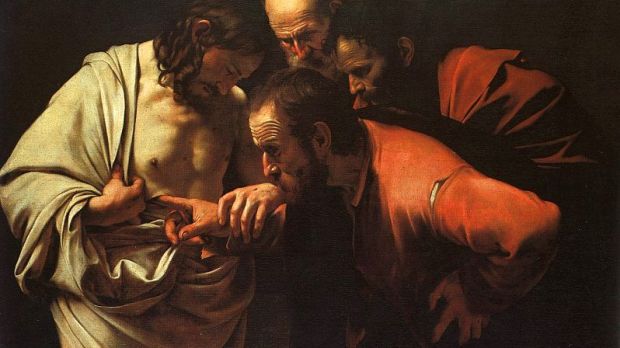Have you come to believe because you have seen me?—John 20:29
In those first days following the death and burial of Jesus, the apostles were left adrift. After all, the One who had been their focus and point of reference through years of mission and service was gone. It seemed that God had gone quiet, no longer speaking to the them, guiding them. God was certainly not helping them understand why things played out as they did. As their hopes crumbled around them, there was no escaping the darkness brought on by the crucifixion. The disappointment and disillusionment of Good Friday had not yet been transformed the light of Easter.
On that first Easter Sunday, Thomas had been absent when Jesus first appeared to the apostles. Should it be any wonder, then, that he would still be beleaguered by Holy Saturday sadness?
Can we really fault him for wanting to verify in a personal, concrete way the fantastic tale of resurrection being told by Mary Magdalene and the others?
With these same themes in mind, Pope Francis has reflected, “Doesn’t the same thing also happen to us when something completely new occurs in our everyday life? We stop short, we don’t understand, we don’t know what to do. Newness often makes us fearful, including the newness which God brings us, the newness which God asks of us” (Homily for the Easter Vigil, 2013).
Although Thomas did not initially believe in the resurrection of the Lord, he remained faithful to the call he had received from Jesus — the call to be a part of the community of the apostles. And even though Thomas’ doubts would not allow him to believe that the others had seen the Lord, he did not lose faith in their fraternity and it was in and through that community that the Lord appeared to him and strengthened Thomas’ faith.
In The Genesee Diary, Henri Nouwen recalled that Dydimus, the name of Thomas, means “twin” and that the Fathers of the Church had commented that all of us are “two people: a doubting one and a believing one. We need the support and love of our brothers and sisters to prevent our doubting person from becoming dominant and destroying our capacity for belief.” And so, we might say that the Church, on this Second Sunday of Easter, is inviting us reflect not so much on “Doubting Thomas” as on the living and dynamic faith of the community of which Thomas was a part.
The Church — the community of faith built upon the witness of Peter, Thomas and the other apostles and disciples of the Lord — is where we experience the resurrection today. While we cannot have a physical experience of Jesus, we do have the privilege of meeting the Lord in Word and sacrament: “The community of believers is the place of God’s revelation, the divine presence. … Eternity touches history in the community of Christian believers, the Evangelist boldly proclaims. So, for them, eternity is now” (Robert Kysar, John: The Maverick Gospel). Through the mission of the church, the faithful witness of the apostles has spread from the enclosed group in that sealed Upper Room, across the ages, to the ends of the earth.
While we know that faith is a gift, believing is not automatic or easy — the doubt of Thomas is certainly far easier for us to relate to than the sublime prayer and contemplation of the great pray-ers and mystics of the Church. Suffering, evil, injustice, discrimination, crimes against the innocent and vulnerable, sickness and enduring hunger put our faith to the test.
And yet Thomas’ faith allows us to discover something much more profound and true than suffering and death: the face of the God who, in Christ, has taken upon himself our broken humanity. As Pope Benedict XVI observed, “Thomas has received from the Lord, and has in turn transmitted to the Church, the gift of faith put to the test by the passion and death of Jesus and confirmed by meeting him risen. His faith was almost dead but was born again thanks to his touching the wounds of Christ, those wounds that the Risen One did not hide but showed, and continues to point out to us in the trials and sufferings of every human being” (Urbi et Orbi Message, 2007).
This is the mystery of the love we celebrate on the Second Sunday of Easter, the Feast of Divine Mercy.
At the conclusion of St. John’s account of Thomas’ encounter with the risen Lord, Jesus proclaims, “Blessed are those who have not seen and have believed” (20:19). Blessed are we when we accept what has been handed down to us in the authentic traditions and teachings of the Church. Blessed are we when are willing to welcome Jesus who is embodied in the texts that speak of him. Blessed are we when we accept Jesus who is embodied in the sacraments. Blessed are we who recognize Jesus embodied in the lives of the saints. Blessed are we when we reach out to Jesus who is embodied in the little ones of the earth.
To read this Sunday’s Mass readings, click here.
Silas S. Hendersonis in formation with the Society of the Divine Savior (the Salvatorians) and currently serves as the managing editor of Abbey Press Publications and Deacon Digest magazine. He is the author of numerous reflections and books. He can be found at www.fromseason2season.blogspot.com and www.facebook.com/SilasSHenderson.

